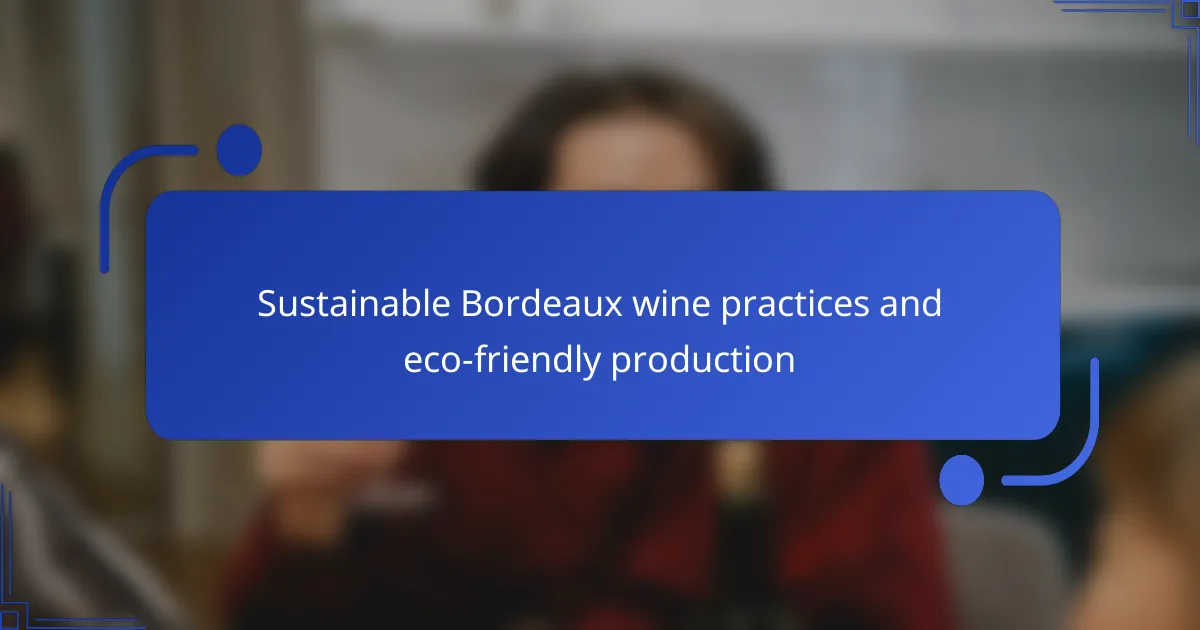
What are Sustainable Bordeaux Wine Practices?
Sustainable Bordeaux wine practices involve environmentally friendly techniques used in viticulture and winemaking. These practices aim to reduce the ecological impact of wine production. Techniques include organic farming, which avoids synthetic pesticides and fertilizers. Biodynamic farming, which incorporates holistic and ecological principles, is also prevalent. Water conservation methods, such as drip irrigation, help manage resources efficiently. Soil health is maintained through cover cropping and reduced tillage. Sustainable certifications, like the HVE (Haute Valeur Environnementale), validate these practices. Bordeaux vineyards have reported improved biodiversity and soil quality through these methods. These efforts contribute to the long-term viability of the wine industry in the region.
How do these practices contribute to environmental conservation?
Sustainable Bordeaux wine practices contribute to environmental conservation by reducing chemical inputs and promoting biodiversity. These practices include organic farming, which eliminates synthetic pesticides and fertilizers. This leads to healthier soil and water systems. Cover cropping is another method used, which enhances soil fertility and reduces erosion. Crop rotation also helps maintain soil health and decreases pest populations. Additionally, sustainable practices often involve water conservation techniques, such as drip irrigation, which minimizes water waste. Research indicates that organic vineyards have higher biodiversity levels compared to conventional ones. The integration of these practices supports ecosystem balance and mitigates climate change impacts.
What specific methods are employed in sustainable viticulture?
Sustainable viticulture employs methods such as cover cropping, integrated pest management, and organic farming. Cover cropping enhances soil health and reduces erosion. Integrated pest management minimizes chemical usage by using natural predators. Organic farming avoids synthetic pesticides and fertilizers, promoting biodiversity. Additionally, practices like water conservation and precision viticulture optimize resource use. These methods contribute to environmental sustainability and improve grape quality. Studies indicate that sustainable practices can increase vineyard resilience and yield over time.
How do these methods reduce carbon footprints?
Sustainable Bordeaux wine practices and eco-friendly production methods reduce carbon footprints by minimizing greenhouse gas emissions. These methods include organic farming, which avoids synthetic fertilizers and pesticides. This practice enhances soil health and reduces the need for fossil fuel-based inputs. Crop rotation and cover cropping improve biodiversity and soil structure. The use of renewable energy sources, such as solar power, further cuts emissions in production processes. Efficient water management reduces the energy required for irrigation. According to a study by the International Organisation of Vine and Wine, sustainable practices can lower carbon emissions by up to 30%. Implementing these methods not only benefits the environment but also contributes to more resilient vineyard ecosystems.
Why is sustainability important in the Bordeaux wine industry?
Sustainability is crucial in the Bordeaux wine industry to ensure long-term environmental health and economic viability. Bordeaux’s vineyards face challenges like climate change, soil degradation, and water scarcity. Sustainable practices help mitigate these issues by promoting biodiversity and reducing chemical inputs. For instance, organic and biodynamic farming methods enhance soil quality and ecosystem balance. Additionally, sustainable practices can improve wine quality, as healthier vines produce better grapes. The Bordeaux region has seen a rise in certifications for sustainable practices, reflecting a commitment to environmental stewardship. Studies show that sustainable vineyards can yield higher profits due to consumer demand for eco-friendly products. Thus, sustainability is integral to the Bordeaux wine industry’s future.
What challenges does the Bordeaux wine industry face regarding sustainability?
The Bordeaux wine industry faces significant challenges regarding sustainability. Climate change impacts grape quality and yields. Increased temperatures can lead to earlier harvests and altered flavor profiles. Water scarcity is another concern, affecting irrigation practices. Additionally, the use of pesticides and fertilizers raises environmental and health issues. The industry also struggles with balancing traditional practices and modern sustainable methods. Regulations and consumer demand for organic products further complicate transitions. These challenges require innovative solutions to ensure long-term viability and environmental responsibility.
How does consumer demand influence sustainable practices?
Consumer demand significantly drives sustainable practices in the Bordeaux wine industry. As consumers increasingly prioritize eco-friendly products, wineries respond by adopting sustainable methods. This shift includes organic farming, reduced chemical use, and water conservation techniques. Research indicates that 70% of consumers prefer brands with sustainable practices. Additionally, wineries that embrace sustainability often see increased sales and customer loyalty. In Bordeaux, many producers have transitioned to certified organic or biodynamic practices to meet this demand. Consequently, consumer preferences directly shape the industry’s approach to sustainability.

What are the eco-friendly production techniques used in Bordeaux wine?
Bordeaux wine producers utilize several eco-friendly production techniques. These techniques include organic farming practices, which avoid synthetic pesticides and fertilizers. Many vineyards in Bordeaux implement integrated pest management. This method promotes biodiversity and uses natural predators to control pests. Cover cropping is also common, which improves soil health and reduces erosion. Bordeaux wineries are increasingly adopting precision viticulture. This technology optimizes resource use, such as water and nutrients. Additionally, some producers employ biodynamic farming methods. These methods consider the lunar calendar and cosmic rhythms for planting and harvesting. Many Bordeaux estates are committed to reducing their carbon footprint. They invest in renewable energy sources and sustainable packaging solutions.
How does organic farming differ from conventional methods?
Organic farming differs from conventional methods primarily in its use of synthetic inputs. Organic farming prohibits synthetic pesticides and fertilizers. Instead, it relies on natural alternatives for pest control and soil fertility. This method promotes biodiversity and soil health through crop rotation and composting. In contrast, conventional farming often utilizes chemical inputs to enhance yield. Research indicates that organic practices can lead to healthier ecosystems. Studies show organic farming can reduce soil erosion and improve water quality. Overall, the fundamental differences lie in the approach to inputs and the emphasis on sustainability.
What are the benefits of organic farming for Bordeaux wine production?
Organic farming enhances Bordeaux wine production by promoting healthier vineyards and improving wine quality. It reduces chemical inputs, leading to a more sustainable ecosystem. Organic practices increase soil fertility, which supports vine health and resilience. Biodiversity is enhanced, attracting beneficial insects and reducing pests naturally. This results in lower disease incidence and reduced need for synthetic pesticides. Organic wines often exhibit unique flavor profiles, reflecting the terroir more authentically. According to a study by the University of Bordeaux, organic vineyards showed higher levels of phenolic compounds, contributing to better wine quality. These attributes align with the growing consumer demand for sustainable and environmentally friendly products.
How is pest management approached in organic vineyards?
Pest management in organic vineyards is approached through natural and sustainable methods. Organic practices prioritize biodiversity to enhance ecosystem balance. Techniques include the use of beneficial insects, such as ladybugs, to control pests naturally. Crop rotation and cover cropping are employed to disrupt pest life cycles. Organic vineyards also utilize organic-approved pesticides derived from natural sources. These methods reduce chemical residues and promote soil health. Research demonstrates that integrated pest management can significantly decrease pest populations while maintaining grape quality. Studies show that organic vineyards can effectively manage pests without synthetic chemicals, ensuring environmental sustainability.
What role does biodynamic farming play in Bordeaux wine production?
Biodynamic farming plays a significant role in Bordeaux wine production by enhancing soil health and biodiversity. This method emphasizes the use of organic practices and the integration of natural ecosystems. Biodynamic farms in Bordeaux often utilize compost, herbal preparations, and crop rotations to enrich the soil. These practices contribute to the vitality of the vineyards and improve grape quality.
Research shows that biodynamic methods can lead to more resilient vines. A study by the University of Bordeaux indicated that biodynamic vineyards exhibit greater ecological balance. This balance can result in wines with distinct flavors and characteristics. Additionally, biodynamic farming aligns with the growing consumer demand for sustainable products. The approach has gained recognition among several prestigious Bordeaux estates, further validating its importance in the region.
What principles guide biodynamic farming practices?
Biodynamic farming practices are guided by principles that emphasize holistic, ecological, and ethical approaches to agriculture. These principles include the understanding of the farm as a self-sustaining ecosystem. Biodynamic practices prioritize soil health and biodiversity. They utilize organic methods and avoid synthetic chemicals. Another principle is the use of astronomical calendars for planting and harvesting. This is based on the belief that celestial influences affect plant growth. Additionally, biodynamic farming incorporates composting and cover cropping to enhance soil fertility. The approach also emphasizes the importance of local and community-based farming practices. These principles collectively aim to create a sustainable and regenerative agricultural system.
How does biodynamic farming impact wine quality?
Biodynamic farming enhances wine quality through holistic agricultural practices. This method emphasizes soil health, biodiversity, and natural farming cycles. Biodynamic vineyards use organic compost and herbal preparations to enrich the soil. This leads to healthier vines and better grape quality. Studies indicate that biodynamic wines often exhibit greater complexity and depth of flavor. Research published in the Journal of Wine Research found that biodynamic wines scored higher in sensory evaluations compared to conventional wines. The unique farming practices also promote resilience against pests and diseases, further improving grape integrity. Overall, biodynamic farming significantly contributes to superior wine quality in Bordeaux and beyond.

How can consumers identify sustainable Bordeaux wines?
Consumers can identify sustainable Bordeaux wines by looking for specific certifications. These certifications include the “Haute Valeur Environnementale” (HVE) label, which indicates environmentally friendly practices. Another indicator is the “Vin Méthode Nature” label, signifying organic and biodynamic methods. Additionally, consumers should check for transparency in production methods from wineries. Sustainable Bordeaux producers often share information about their practices on labels or websites. Research shows that sustainable practices can lead to higher quality wines. According to the Bordeaux Wine Council, over 60% of Bordeaux vineyards are engaged in sustainable practices.
What certifications should consumers look for in sustainable wines?
Consumers should look for certifications such as Organic, Biodynamic, and Sustainability certifications in sustainable wines. Organic certification indicates that grapes are grown without synthetic pesticides or fertilizers. Biodynamic certification goes further, incorporating holistic farming practices and lunar cycles. Sustainability certifications, like the Sustainable Winegrowing Program, assess environmental practices and social responsibility. The presence of these certifications ensures adherence to eco-friendly production methods. Studies show that certified sustainable wines often have lower environmental impacts compared to conventional wines.
How do these certifications ensure eco-friendly practices?
Certifications ensure eco-friendly practices by establishing strict guidelines for sustainable farming. These guidelines often include limiting pesticide use and promoting organic farming methods. They require regular monitoring of vineyard practices to ensure compliance. Certifications also encourage biodiversity by promoting the planting of cover crops and maintaining natural habitats. Additionally, they mandate the reduction of water usage and energy consumption in production processes. These practices help lower the carbon footprint of wine production. Research indicates that certified vineyards show significant improvements in soil health and ecosystem balance. Studies have found that certified sustainable practices lead to a 30% reduction in chemical inputs.
What labels are commonly associated with sustainable Bordeaux wines?
Common labels associated with sustainable Bordeaux wines include “Haute Valeur Environnementale” (HVE), “Terra Vitis,” and “Organic.” HVE certification indicates a commitment to environmental practices in viticulture. Terra Vitis promotes sustainable winegrowing while ensuring quality. Organic labels signify that no synthetic chemicals are used in production. These labels reflect the growing trend towards eco-friendly practices in Bordeaux wine production. They help consumers identify wines produced with sustainability in mind.
What are some best practices for supporting sustainable wine production?
Best practices for supporting sustainable wine production include implementing organic farming methods. Organic practices reduce chemical inputs and promote biodiversity. Utilizing cover crops enhances soil health and prevents erosion. Integrated pest management minimizes pesticide use by employing natural predators. Water conservation techniques, such as drip irrigation, optimize water usage. Employing renewable energy sources reduces carbon footprint in wine production. Certification programs, like organic or biodynamic, ensure adherence to sustainable practices. Engaging in community initiatives fosters local support and awareness for sustainability in wine production.
How can consumers make informed choices when purchasing wine?
Consumers can make informed choices when purchasing wine by researching the wine’s origin and production methods. Understanding sustainable practices is crucial. Bordeaux wines often highlight eco-friendly production methods, such as organic and biodynamic farming. Checking for certifications can provide assurance of these practices. Labels indicating sustainability, like “organic” or “vegan,” guide consumers. Reading reviews and ratings from trusted sources can also help assess quality. Engaging with local wine experts or attending tastings offers firsthand knowledge. Knowledge of grape varieties and their characteristics aids in selecting wines that suit personal preferences.
What actions can consumers take to promote sustainability in the wine industry?
Consumers can promote sustainability in the wine industry by choosing organic and biodynamic wines. These wines are produced without synthetic pesticides or fertilizers, reducing environmental impact. Supporting local wineries also minimizes transportation emissions. Consumers should opt for wines in eco-friendly packaging, like lightweight glass or recycled materials. Participating in recycling programs for wine bottles helps reduce waste. Educating themselves about sustainable practices and seeking out certified sustainable wines fosters demand for eco-friendly options. Lastly, advocating for sustainability initiatives within the industry encourages producers to adopt greener practices.
Sustainable Bordeaux wine practices encompass environmentally friendly techniques in viticulture and winemaking aimed at reducing ecological impact. Key methods include organic and biodynamic farming, water conservation, and integrated pest management, which enhance soil health and promote biodiversity. The article explores the benefits of these practices, their role in environmental conservation, and the challenges faced by the Bordeaux wine industry. It also highlights the influence of consumer demand for sustainability and the importance of certifications that validate eco-friendly production methods.
